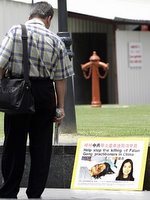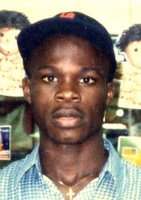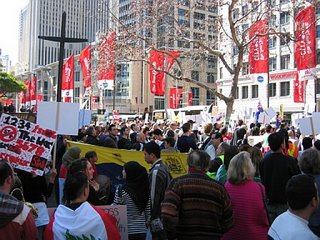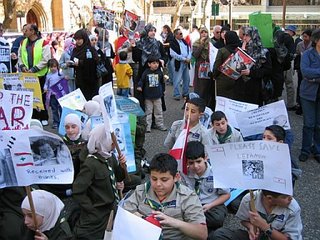Another reply on a TODAY article. Our Senior Minister, who makes a comment about Middle East politics, needs to get his facts right.
===
I read with disdain and alarm on the report, entitled, “A lesson on basic politics; It was wrong decision for Hezbollah to 'test' Israel's new Prime Minister: SM Goh”
It appears that the TODAY news report has painted a one-sided view of the current Israel - Lebanon conflict. Our SM has also chosen to comment on an issue which is seemingly pro-Israel and US; and does not reflect my views as a Singaporean.
As such, I felt it necessary to write in to clarify, with the hope that my letter will be published and to allow Singaporeans to form their own opinions.
While PM Goh felt that the capturing of the two Israeli soldiers is a good reason for Israel to start the war, the truth is far more complicated. The capturing of the Israeli soldiers was to negotiate a prisoner exchange - swapping them for Samir Kuntar and other Lebanese prisoners held by Israel.
TODAY also reported that our PM “gave another take on the Israeli point of view, which is that Hezbollah wants to destroy all of Israel and its people.”
This is again not the entire truth. Hezbollah was formed to combat the Israeli occupation following the 1982 invasion of Lebanon which fundamentally opposes the existence of the Israeli state; BUT not to kill or annihilate Israel or its people.
In Hezbollah's website, there is a distinction between "Zionist ideology" and Judaism. The former is an attitude across "races, religions, and nationalities". Zionism is defined as "the concept of creating 'Israel' by the use of force and violence, by stealing the Arabs’ lands and killing Palestinians". "[O]pposing the Zionists ideology is not opposing setting a home for Jews".
What is of most significance important at this immediate point in time is a ceasefire, rather than openly supporting the Israel or Lebanon government as our SM has done; as innocent civilians from both countries are suffering from the wanton destruction of warfare.
In particular in Lebanon, its infrastructures such as the Beirut airport, residential buildings, ambulances, United Nations posts and personnel, ports, bridges, roads, factories, medical and relief trucks, mobile telephone and television stations, fuel containers and service stations has been destroyed by Israeli air strikes.
According to a BBC report, “Hezbollah 'will observe UN truce' “ dated 12 August 2006, http://news.bbc.co.uk/2/hi/middle_east/4787179.stm, “more than 1,000 Lebanese and more than 120 Israelis have been killed in the conflict since Hezbollah militants captured two Israeli soldiers on 12 July in a cross-border raid.”
A lesson on basic politics
It was wrong decision for Hezbollah to 'test' Israel's new Prime Minister: SM Goh
Friday • August 11, 2006
Call it an outsider's point of view or call it Politics 101, but Senior Minister Goh Chok Tong believes Hezbollah should not have captured two Israeli soldiers five weeks ago.
The move by the Islamist organisation preceded Israel's offensive in Lebanon, which has now killed more than 1,000 people.
While he described the conflict as a tragedy, Mr Goh called it a wrong decision to test Israel's leader Ehud Olmert, who was sworn in as Prime Minister two months before the abduction.
"When two soldiers are kidnapped, a new Prime Minister must not show weakness; that is basic politics," said Mr Goh, who was speaking two weeks ago to journalists from the Middle East.
He gave another take on the Israeli point of view, which is that Hezbollah wants to destroy all of Israel and its people.
Mr Goh revealed his own shock to hear that the militia group had 13,000 missiles not under the control of the Lebanese government.
"Therefore, Israel says if that is your aim, I must disarm you, and this is in fact its motive," he said, in a report Wednesday by Arab News.
On Iran's involvement in the current conflict, he described it as speculation but added: "I do have reports that some Iranian Revolutionary Guards have been killed among Hezbollah fighters. What are they doing there? Are they supplying missiles to Hezbollah?"
Asked if the Islamic Shia organisation was fighting a war on behalf of Iran, he said: "I think it is in part a war on behalf of Iran."
Still, he said he is hopeful the conflict will not engulf the region.
"The Americans don't want an expansion because Washington has enough problems in Iraq and America would be vital to Israeli success if the war was expanded. Israel, on its own, will not expand to involve Iran and Syria. That would be very risky," he said.
What is needed for a ceasefire to be called, he said, is to "get the friends of both involved in order to calm things down".
For a long-term solution, he called on Palestinians and Hezbollah to recognise Israel's right to exist.
"That's important because if others don't recognise Israel's existence, then what is there for Israel to do other than fight and destroy you?" he asked. "Israel also must recognise the rights of others."
Mr Goh said that Singapore is just an outsider to the current Middle East problem, as the conflict is too big for the city-state to play a role in resolving. The big powers have to settle it in the United Nations.
"We would be happy to express a view on the conflict based on principles and we have done so. We aim to be even-handed," he said.
"We don't take the side of Israel or the Palestinians; we look at the problem as outsiders and we express our view of a particular problem.
"It is a kind of principled role which we hope we can play in the United Nations. We must always argue from the basis of justice, equality, fairness."
Copyright MediaCorp Press Ltd. All rights reserved.


 [Cartoon from My Sketchbook
[Cartoon from My Sketchbook

